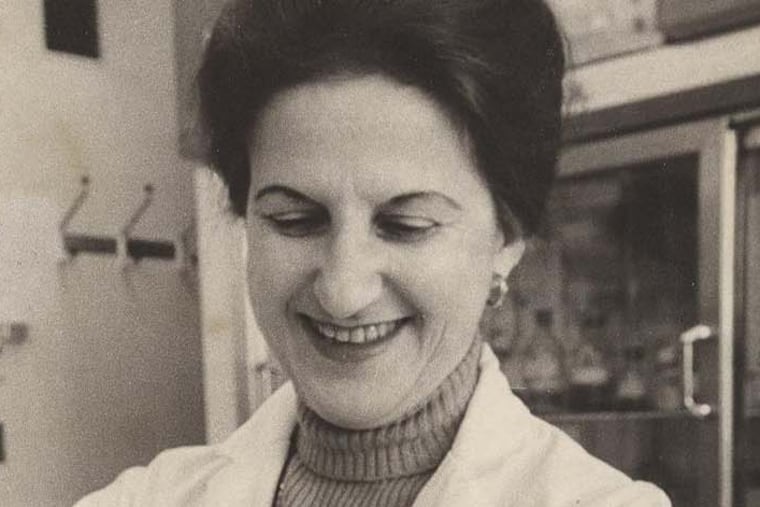Beatrice Mintz, groundbreaking research icon at Fox Chase Cancer Center, dies at 100
A tireless scientist, she was twice nominated for the Nobel Prize and would have won, friends said, had she been more accommodating to those who made the selection.

Beatrice Mintz, 100, of Philadelphia, a pioneering, award-winning research scientist in developmental biology and genetics, gene-transfer technology, epigenetics, and tumor microenvironment, died Monday, Jan. 3, of heart failure at her home in Elkins Park.
Even as she was entering her 62nd year in Philadelphia, Dr. Mintz never officially retired. She started working at the Institute for Cancer Research in 1960, stayed on when it became part of the Fox Chase Cancer Center in 1974, and went on to become one of its most celebrated researchers.
A professor and member of the center’s cancer biology program, she held the prestigious Jack Schultz Chair in Basic Science from 2002 to 2019 and was known for pursuing answers to what she considered the big questions of scientific life.
Nominated twice for a Nobel Prize, she received the 2012 Lifetime Achievement Award from the American Association for Cancer Research, the 1997 National Medal of Honor for Basic Research from the American Cancer Society, the first Ernst Jung Gold Medal for Medicine in 1990, the first Genetics Society of America Medal in 1981, and many other awards and medals.
“She is … one of those people who, if she had been a better politician, would have probably won a Nobel Prize,” John R. Durant, former president of Fox Chase, told The Inquirer in 1986.
Employing complex laboratory procedures and technology she had to create because none existed in the 1960s and ’70s, she was one of the first scientists in the world to discover that a small number of stem cells can create a complex animal and that normal cells can be transformed into cancer cells.
Using mice in her experiments, Dr. Mintz combined embryo cells of genetically different strains and, by tracing the development of the genetic differences, learned that stem cells create copies of themselves. That was important, Dr. Mintz said in a 2018 article in Temple Health Magazine, because it “pointed to the possibility of using such cells to replace defective cells in humans.”
Regarding cancer, Dr. Mintz found that its growth resulted from a single cell instead of a combination of cells, and that cancer cells can be normalized if transferred and developed in a normal environment.
Taking into consideration the countless other experiments, observations, and achievements over her 75-year career, it is hard to overstate Dr. Mintz’s contributions to developmental cancer biology and genetics research, other scientists said. They called her work “otherworldly,” “innovative,” “unprecedented,” “extraordinary,” and “unequaled,” and said that her method of using animal models to study human cancer changed modern medicine.
“She was unique in that she was foundational in more than one field,” said Jonathan Chernoff, cancer center director at Fox Chase. “She was still productive into her 90s, and was a solo act the whole time.”
Born Jan. 24, 1921, in the Bronx, Dr. Mintz grew up poor in an Italian neighborhood. She graduated from Hunter College in New York in 1941 and earned her master’s degree and doctorate in biology from the University of Iowa.
She worked as a professor of biological science at the University of Chicago from 1946 to 1960, and earned a Fulbright research fellowship in 1951 to study in Paris and Strasbourg, France.
She wrote hundreds of scientific papers, served on numerous editorial boards, and received half a dozen honorary degrees. In 1986, Pope John Paul II asked her to work with the elite Pontifical Academy of Sciences to research the development of human embryonic stem cells and other scientific issues of the day.
She was an elected member of the National Academy of Sciences and a fellow with the American Association for Cancer Research, the American Academy of Arts and Sciences, and the American Association for the Advancement of Science. She also worked as an adjunct professor at the University of Pennsylvania.
Away from the lab, Dr. Mintz wrote poetry, collected art, and sang. She was fluent in French and especially proud of her dancing. She lived in apartments in Elkins Park and Rittenhouse Square and could be both “sweet as pie” and “prickly as a cactus,” friends said.
The vanity license plate on her light-blue Chevrolet in the 1980s read “GENOME.”
“If you did something for Bea, she never forgot it and reciprocated,” said her longtime friend Bob Spallone. “She was a strong woman and could be both intimidating and very gracious.”
In 2018, she told Temple Health Magazine that, while the many accolades she accepted were nice, the core motivation to her work was “simply the pursuit of a series of questions that I’ve enjoyed answering.”
The youngest of four children, Dr. Mintz never married and did not have children. She is survived by several relatives. Two sisters and a brother died earlier.
She requested no services be held and left her estate to several cancer research organizations.